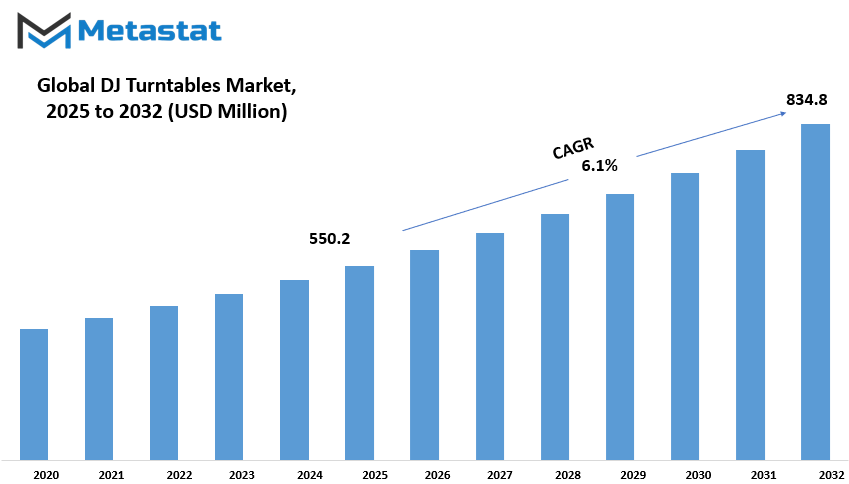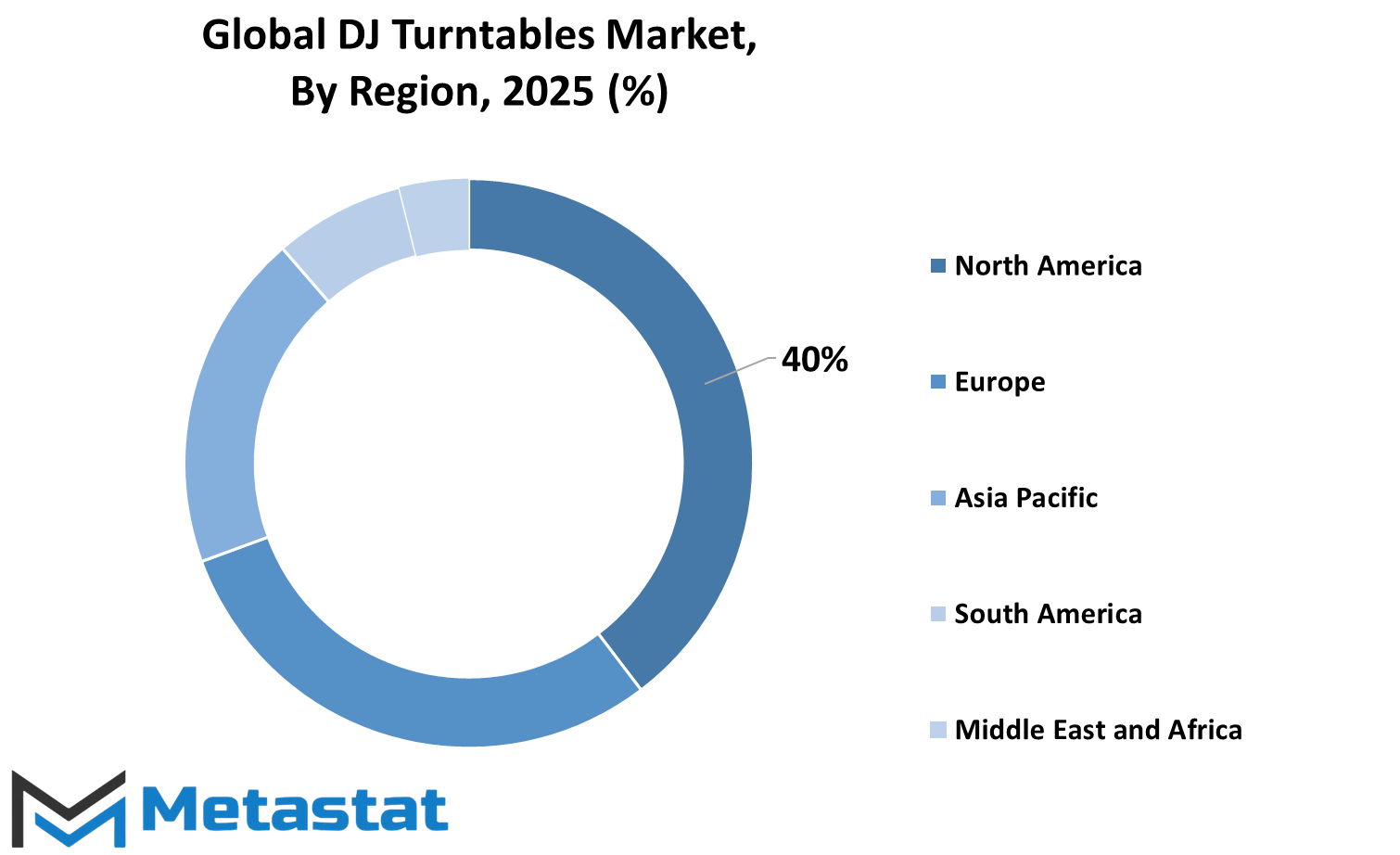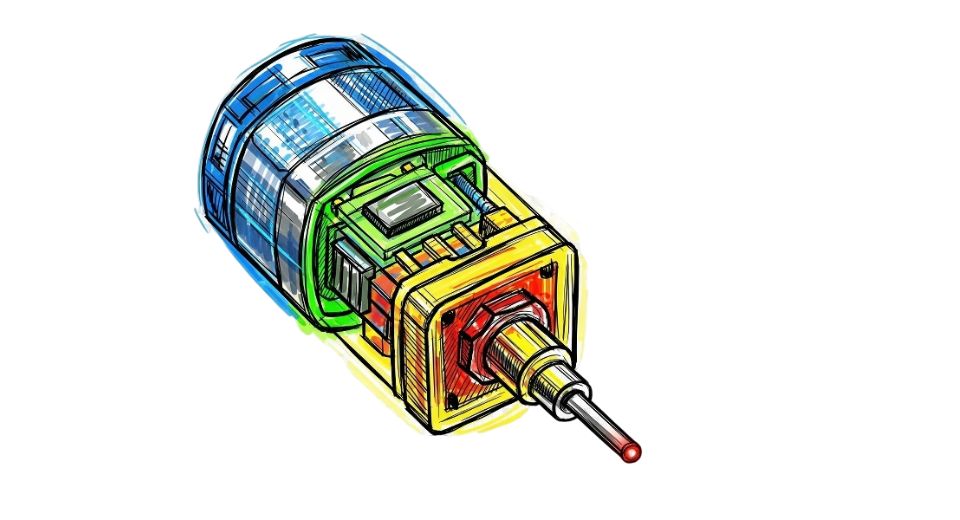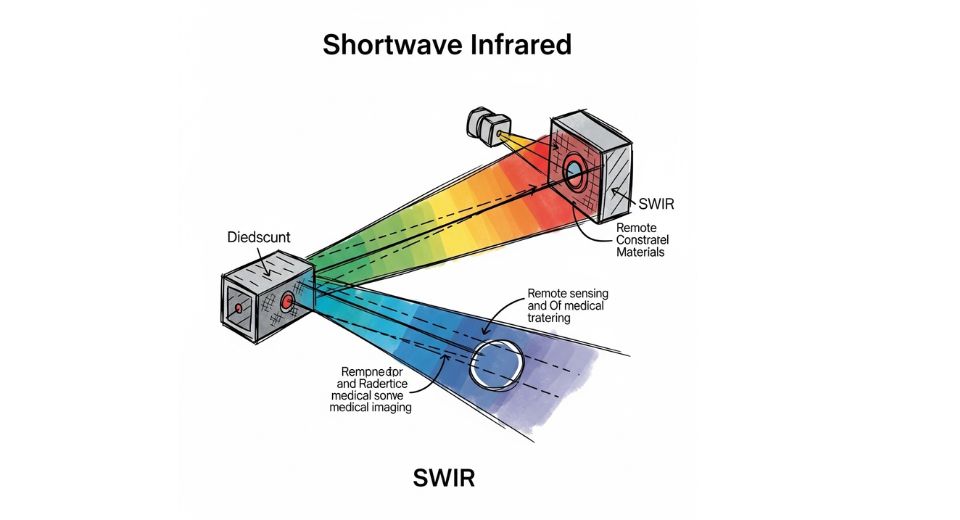MARKET OVERVIEW
The Global DJ Turntables market, which is continually redefined by the changing taste in music and advancements in sound engineering. A specific market segment of broader audio equipment, this type is more observed by a section of a populace dedicated to its welfare-attention above mass appeal-professional DJs, audiophiles, and music enthusiasts who want accuracy and durability rather than simple superficialities. As against mass-market music accessories, DJ turntables have an insuperable tactile experience where touch and timing can be as much as sound reproduction.
In the impending years, the Global DJ Turntables market's journey will lean more toward innovation than losing its authenticity that gives meaning to its products. Manufacturers will be heading to ways of creating analog-digital bridges while anchoring the manual control that every DJ glorifies. As continuously driving new DJ entrants into the pool through digital controllers and software, the turntable still not only remains a sound reproduction source-it is a mark of skill, craftsmanship, and live energy. This authenticity will not always be possible to achieve through pure software, hence keeping traditional turntables for all high-level performances, albeit with morphing technology.
Customization will start cultivating recent design philosophies that incorporate their modularity to permit designers' pitch controls, tonearms, and plinth materials to become personal. Ergonomics will come with such offers and intensify the consumers' loyalty to the brand. As performance spaces will become even more heterogeneously defined-from underground events to elite clubs-the increasing need for turntables versatile enough to combine such acoustic states will follow. This will require a transformation in focus from sound fidelity to flexibility.
The Global DJ Turntables market will also change its supply and distribution architecture. Direct sales to final consumers via niche websites, limited-edition releases, and artist collaborations promise new sources of revenue, especially among collectors and avid hobbyists. It is not about how many but by whom such changes will be brought into the fold. These upside-down users cut across geographical boundaries and have in the past been viewed as peripheral (parts of South America and Southeast Asia). With thriving electronic music scenes and interest in DJ culture, they are sure to attract greater market attention.
Sustainability, then, means a new "not-a-fad" design demand: turntables made from recycled or sustainable materials, packaged environmentally friendly, will begin to gain more traction. It is also going to chime in with a major concern in the environment and will undoubtedly appeal to a generation that has associated product ethics with the identity of the brands.
Global DJ Turntables market is estimated to reach $834.8 Million by 2032; growing at a CAGR of 6.1% from 2025 to 2032.

GROWTH FACTORS
Changes in music culture, technology, and entertainment habits have noticeably driven the growth of the Global DJ Turntables Market. The main factor propelling this growth is the increase in the number of live music events being held. These gatherings are high energy and full of people; therefore, DJs are relied upon to keep the energy flowing. With the rising popularity of such events, it is expected that there will be an increased demand for durable and efficient DJ turntables. Another major reason for this is the increasing appeal of electronic dance music or EDM. This genre has snatched a tremendous crowd, especially among the youth, and the beat-driven form of this genre makes it a necessity to have turntables as an essential tool for mixing and performing.
While there are practices that will stimulate growth, challenges are indeed at hand. A foremost challenge facing the industry is the prohibitive price of professional-grade turntables. While veteran DJs in the advanced countries may well be willing to invest in top-notch equipment, beginners or hobby DJs in developing regions may never be able to afford the price set on such devices. This confines the market spread in regions with market potential but inadequate disposable income. The next impediment is the use of digital DJ software. These programs offer the maximum convenience and flexibility, letting DJs mix music on laptops and tablets without using real turntables. With more people opting for digital setups, demand for traditional hardware may take a hit.
However, opportunities are abundant for the market to thrive. One very attractive area is the integration of smart technology into turntables. Wireless connectivity, app compatibility, and touch-sensitive controls are attractive to tech-savvy consumers, thereby rendering these products easier to use for these consumers. This will attract not only professional users but also beginner users who wish for equipment that is easy to use and is packed with modern features. More DJ training programs and online tutorials are also important in this regard. The more people learn about DJing and get the urge to try their hands at it, the more the chance that there will be first-time buyers. Such users might be in need of tools that are affordable and reliable for them to practice and perform. Such a situation might lead to continuous market growth.
In brief, while the Global DJ Turntables market still has to contend with challenges revolving around costs and competition from digital tools, it also has great clouds scattered in between. Increased interest in music performance supported by live events, EDM culture, and technologies that are easier to use will push the market up further in the years ahead.
MARKET SEGMENTATION
By Type
The global DJ turntables market has persistently been predicted to grow steadily over the years. An increase in music experiences is driving this, especially among young people and professional DJs. As more events and live performances become increasingly popular, so will the demand for high-quality DJ equipment. Turntables are the heart of these setups; hence, they are a very important tool for both artists and music lovers. It will create greater demand in the market while encouraging innovation from manufacturers who will always look for better performance, durability, and sound quality in their products.
Further, the classifications in the type include Direct Drive Turntables and Belt Drive Turntables. Among those segments, Direct Drive Turntables occupy a huge chunk and are valued at $342.0 million. Essentially, these turntables are most common among professionals as they have quick start-up time and are sturdier and durable, especially in environments with heavy use, such as those at clubs or music festivals. Most people tend to use Belt Drive Turntables to start or for cheaper alternatives, as they do not vibrate much, which can be useful when recording with these systems in certain environments, like studio settings.
Technological advancement also plays a major role in deciding the nature of this market. Companies in the market are now adding features like USB connectivity and digital controls that help in bridging the traditional analog sound with modern checking. Such advances facilitate recording, editing, and sharing of mixes with much ease, thereby increasing turntables' appeal among seasoned and even new users just starting out in DJing. At the same time, better materials and design improvements keep making newer models more reliable and easier to use.
Moreover, the resurgence of turntables is also owing to the fact that vinyl records are becoming more popular. It is now considered more authentic listening to music, which is making people invest in turntable systems, going even far as to buy them for personal usage. Thus, the market is adding new customer categories, from home listeners to collectors.
The Global DJ Turntables market has a great deal to look forward to from cultural trends, improved product features, and the growing trend in live music. As product lines such as Direct Drive Turntables and Belt Drive Turntables accommodate different users, the market will continue to grow, providing opportunities for companies that are ready to adapt and grow with changing demands.
By Operation
Based on the method of operation, the Global DJ Turntables market is essentially divided into manual and automatic types. Each of these offers a variety of features and benefits that will appeal to different kinds of users depending on their level of experience, preferences, and budgets. Manual turntables require the user to place the tonearm onto the record and to lift it off the record at termination. This gives more control to the DJ over the playback and is preferred by professionals requiring precision and full involvement in their performance. It is common knowledge that manual turntables are durable and give consistent quality, making them a number one choice for people valuing control and reliability over convenience. Although using them can sometimes be a little tricky, they really allow the DJ to feel more connected with the real music and their audience, something sometimes lacking in automatic systems.
Automatic turntables, however, are the ones whose operation requires a minimum of manual involvement. After pushing the play button, a tonearm will automatically move into position and play the record, then return back when the record is done. The simplicity of this operation appeals to the beginner and to anyone who wishes for a less arduous setup. Automatic turntables are designed to ease the task but not eliminate the vinyl experience. They are good for new DJs still learning or for those who casually like spinning records but do not need to micromanage every detail.
Both manual and automatic turntables have their rightful place in the DJ community. The choice one makes between one or the other is likely to be predicated on personal preference and the level of commitment one wishes to place on the technical side of mixing. Some may want the annoyance of manual turntables, whereas others will appreciate the simplicity and quickness of an automatic. With the rapid evolution of technology, manufacturers have been improving on both types to deliver even better performance, smoother handling, and definitely with added features for a far wider range of situations and user needs.
Be it a newbie in the trade or one who has been mixing for a track for years, a given operating type of DJ turntable is likely to influence a user's interaction with his equipment, hence shaping the overall experience. Appreciating these differences will assist users in making an informed choice for their styles and fitting their goals, thereby guaranteeing maximum satisfaction out of their setups.
By Distribution Channel
The Global DJ Turntables market is indeed witnessing a continuous growth rate; still, it is pretty much dependent on how these products access consumers to direct its flow. Distribution channels are paths along which products travel between manufacturers and their eventual users; in cases with DJ turntables, these largely include multiple key sales avenues. These include online retail, offline retail as in the case of music and electronics stores, selling, wholesale distribution, and rental services.
Online retail has grown so much and continues to grow to be one of the most convenient ways ever for customers to buy DJ turntables. Many clicks allow buyers to compare different models, read reviews, and have their delivery at the doorsteps. Time is saved, and generally, choices of products are wider than local stores. For the sellers, it helps them reduce costs related to operating a physical store, thus reaching buyers in many places, especially where music stores may not have been available.
Still, strong in a space that is of the offline retail area, such as music and electronics stores, many buyers would feel comfortable going to a physical establishment. This way, they can test the equipment before actually deciding to buy it. Purchases are enhanced by knowledgeable staff who can then respond to queries and, in some cases, do demonstrations. These are also the enablement of personal ties with that brand within the immediacy of post-sales support access.
Direct sales are sales that are conducted to consumers by the manufacturer through its website or branded outlets. This means that the manufacturer has control over pricing and interaction with the consumer. It also helps to understand what the buyer wants and change company strategies quickly.
The final relationship chain is the wholesale distribution line, and in this case, it helps the products of DJ turntables reach the larger market. As a precaution, wholesalers purchase in bulk and then sell to smaller retailers or resellers, which in turn makes products more available in many localities. This channel takes care of the needs of supply efficiently and also is indicative of availability consistency.
The rental services are for those customers who might not find it prudent to buy a turntable forever. Such attract even organizers, newbies, or others who want to use an instrument for a short time to test it on their own. It also gives access to high-grade models and those which might be too expensive to possess.
Different distribution channels are different facets to support the increasing Global DJ Turntables market. These serve all sorts of customer needs and preferences, ensuring the products are as easy to find, try, and buy as possible.
By End User
Diverse end-user segments occupy the DJ turntables market, every one with unique demands and preferences, which, in turn, affect product evolution and demand. The main groups include professional DJs performing in clubs, concerts, and festivals. These users rely upon turntables that are highly precise, durable, and equipped with advanced features, such as pitch control and motor torque. Because of the fast-paced and dynamic environment they operate in, they seek equipment that can withstand long hours of use while ensuring repeatable performance. The trends started by some professional DJs are oftentimes adopted by the industry, which in turn dictates the preferences of other groups.
Nonetheless, home and hobbyist DJs form a significant portion of the market. This group generally looks for user-friendly turntables that are affordable but nevertheless of good quality and reliable. While this group may not need the full set of features available on professional equipment, they still value good sound quality and smooth mixing capabilities. Many of the people who comprise this group are either learning the basics or doing mix music as a hobby, so ease of operation becomes a major consideration. Brands that make entry-level models that allow room for the development of skills are often very appealing for this segment.
In studio recording settings, DJ turntables are also put to use. In studio contexts, there is usually an emphasis on sound quality and control. DJs and producers in studios use turntables for sampling, scratching, or imparting some other personalized feel to tracks. This group puts premium value on clear output sound and fine-tuning sound details. As studio environments are more controlled, needs of this kind vary greatly from those in live performance settings.
Radio stations and broadcasting services also involve the use of turntables, in particular, those with music-based programming. Turntables are used for vinyl records or for starting effects for live mixing. On those occasions, reliability and sound clarity assume utmost importance as one is playing for very large audiences. Broadcasters may not need fancy features, though they will certainly demand stable performance and crystal output.
DJ turntables also get some use from event management companies and wedding planners. These users prefer portable and quick-to-setup ones. Events frequently involve various venues and setups; thus, flexibility is an advantage. These users prefer models that would be functional with a simple operational process since having a simple setup is often highly critical.
Lastly, there are other special groups of end users whose needs sometimes may not fall into the above categories, while nevertheless playing a role in the market. Together, all these end-user groups share in the direction and growth of the DJ turntables industry.
|
Forecast Period |
2025-2032 |
|
Market Size in 2025 |
$550.2 million |
|
Market Size by 2032 |
$834.8 Million |
|
Growth Rate from 2025 to 2032 |
6.1% |
|
Base Year |
2024 |
|
Regions Covered |
North America, Europe, Asia-Pacific, South America, Middle East & Africa |
REGIONAL ANALYSIS
The Global DJ Turntables Market, across various prime regions, presents different contributions to the overall market with all geographical specifications. The market regions include North America, Europe, Asia-Pacific, South America, and the Middle East & Africa. The North American market has different constituents that include the United States, Canada, and Mexico. The region is homing on rich music culture and the use of DJ equipment in general with particular attention to DJ turntables, which continue to see alive demand in the markets of live music festivals, clubs, and entertainment centers across the United States. The turning market is developing in Canada and Mexico, fostered by the advancing patronage for electronic music and local music scenes, which are now seeking to embrace modern DJ setups.
In Europe, the UK, Germany, France, Italy, and the rest of Europe are included within scope. Europe may justifiably stake claims on being the most influential region of the DJ community, especially with Germany and the UK demonstrating their lineage in electronic music. Great DJs and popular venues in cities such as Berlin and London sustained the steady demand for high-quality turntables. France and Italy cannot be far behind, with the party scene stimulating increased demand among younger audiences wanting to learn DJing as a skill.
The Asia-Pacific region comprises India, China, Japan, South Korea, and the rest of Asia-Pacific countries. This region is growing at a comparatively higher rate owing to the increase in disposable income, greater interest in music festivals, and the growing acceptance of DJ culture. Japan and South Korea hold bigger market sizes, while India and China are growing fast with a younger population that witnesses music production and DJing as valid activities.
For South America, the countries considered include Brazil, Argentina, and the rest of South America. Brazil accounts for the largest market in the region, supported by its large-scale festivals and vibrant music traditions. Argentina follows closely, with an emergent electronic music scene providing further opportunities for DJ turntable sales. The remaining South American countries are slower to make headway but do harbor future potential as demand embraces them.
Lastly, the Middle East & Africa perspective includes GCC Countries, Egypt, South Africa, and the rest of the Middle East & Africa. The leading country in this region is South Africa, which has a deep relationship with music and increasing interest for modern DJ equipment. Demand is also rife in the GCC countries and Egypt due to the rapidly growing entertainment industry.

COMPETITIVE PLAYERS
The increasing accessibility and popularity of music culture seem to be quite favorable to a small but steady growth of the global DJ turntables market. From a hobby, DJing has turned into a source of income for many, and learning how to DJ has become an activity of interest for people either as an outlet for creativity or as a serious career consideration. Such interest has encouraged improvement in the robustness and affordability of equipment suitable for both novices and professionals. In this space, turntables have their importance, especially for the audience that still believes in the savvy and control of traditional DJ equipment. Digital controllers might be quite popular today, but still, serious artists can enjoy the sensation and sound qualities that vinyl and high-end turntables can provide.
AlphaTheta Corporation (Pioneer DJ), which is definitely one of the most influential companies in the DJ equipment market, is one of the key players in the DJ Turntables industry. Another strong contender is Panasonic Corporation (Technics), as many DJs still enjoy the historic SL-1200 series. inMusic Brands, Inc., which has a number of items that have both innovation and performance, plays an important role; plus, there are others such as Reloop, Gemini Sound, and Audio-Technica, Inc. These companies continue to improve their models, designs, and technology for the today's DJs. Guillemot Corporation S.A. (Hercules DJ), known for its easy-to-use items, especially for the newbies, becomes an example. Other contributors to the market are A.E.B. Industrial Srl (Mixars), Stokyo, Steinigke Showtechnic GmbH (Omnitronic), and Korg Inc.
Intense competition among the brands is a driving factor of innovation and improvement in quality. Most companies focus on sound clarity enhancement, the durability of the products, and the ease of usage. They also realized the importance of keeping pace with the digital integration so that modern DJs could connect their turntables with software and other devices without much hassle. On the other hand, the market respects tradition. Many of the DJs still prefer gear that gives them a classic set-up and hands-on control. This is how the balance between digital growing and traditional values makes the market relevant to all kinds of users.
The prospect for a growing DJ Turntables market looks good since the number of people coming into this field will continue to increase along with the advancement of technology. As long as music is an outlet for self-expressions, so tools that LPs sing out to recapture the magic for bringing out the best in DJs will always be in demand.
DJ Turntables Market Key Segments:
By Type
- Direct Drive Turntables
- Belt Drive Turntables
By Operation
- Manual Turntables
- Automatic Turntables
By Distribution Channel
- Online Retail
- Offline Retail (Music Stores, Electronics Stores)
- Direct Sales
- Wholesale Distribution
- Rental Services
By End User
- Professional DJs (Clubs, Concerts, Festivals)
- Home & Hobbyist DJs
- Studio Recording
- Radio Stations & Broadcasting
- Event Management & Weddings
- Others
Key Global DJ Turntables Industry Players
- AlphaTheta Corporation (Pioneer DJ)
- Panasonic Corporation (Technics)
- inMusic Brands, Inc
- Reloop
- Gemini Sound
- Audio-Technica, Inc.
- Guillemot Corporation S.A. (Hercules DJ)
- A.E.B. Industrial Srl (Mixars)
- Stokyo
- Steinigke Showtechnic GmbH (Omnitronic)
- Korg Inc.
WHAT REPORT PROVIDES
- Full in-depth analysis of the parent Industry
- Important changes in market and its dynamics
- Segmentation details of the market
- Former, on-going, and projected market analysis in terms of volume and value
- Assessment of niche industry developments
- Market share analysis
- Key strategies of major players
- Emerging segments and regional growth potential







 US: +1 3023308252
US: +1 3023308252






